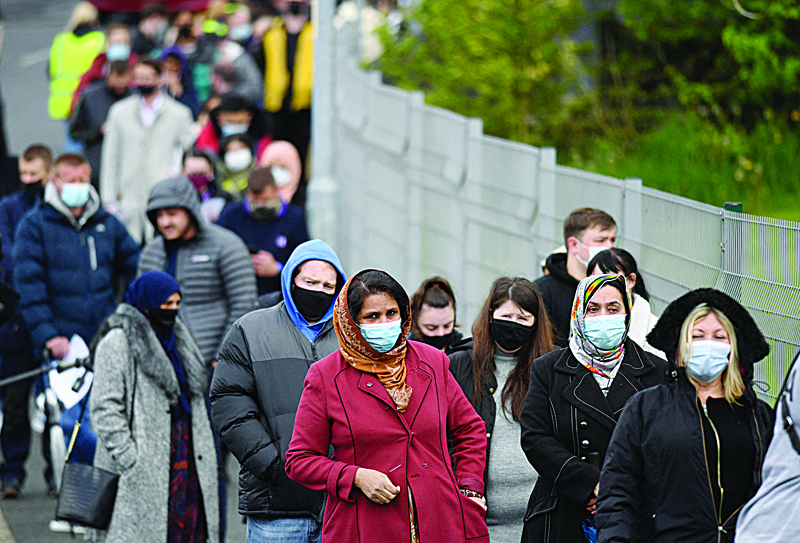 BOLTON: Members of the public queue to receive a COVID-19 vaccine at a temporary vaccination centre at the Essa academy in Bolton, northwest England yesterday. - AFP
BOLTON: Members of the public queue to receive a COVID-19 vaccine at a temporary vaccination centre at the Essa academy in Bolton, northwest England yesterday. - AFP
LONDON: Britain is confident that existing vaccines will provide protection from a more transmissible Indian coronavirus variant now spreading across the country, Heath Secretary Matt Hancock said on Sunday. And hours later, he was able to announce that the country had passed the milestone of 20 million adults vaccinated with two doses of the coronavirus jab.
The news came just before England, Scotland and Wales were unlocking parts of their economy yesterday. But further steps to open up the country again have been put in doubt by the Indian strain. Hancock told Sky News the government had a "high degree of confidence" that vaccines would stand up to the B1.617.2 variant, following new preliminary data from Oxford University. "That means that we can stay on course with our strategy of using the vaccine to deal with the pandemic," he said. Britain, one of the worst-hit countries in the world with over 127,000 deaths, has also seen a rapid deployment of vaccines.
According to government data the case numbers of the Indian variant have risen from 520 to 1,313 this week. In the face of the rising cases centered around the northern towns of Bolton and Blackburn, Prime Minister Boris Johnson announced on Friday that second doses of vaccines would be accelerated for over-50s and the clinically vulnerable.
'Spread like wildfire'
Hancock said the "vast majority" of people in hospital in Bolton with the new variant had been eligible for vaccination but had not come forward. He warned because of the high transmission of the Indian variant it could "spread like wildfire amongst the unvaccinated groups" and because of this the government "need to get as many people vaccinated as possible".
The health secretary defended the government from criticism that it had been too slow to impose travel restrictions on India in the face of the new variant. It was "completely wrong", he said, to suggest the UK could have acted faster to designate India as a "red list" country meaning arriving travellers would have to quarantine in hotels.
India was placed under the strict travel restrictions in April before the variant was under investigation, he said. He also rebuffed any suggestion that any delay in acting had been influenced by a planned trip by Johnson in April to assist in post-Brexit trade talks.
"We take these decisions based on the evidence," he said. Johnson's visit was eventually scrapped because of surging COVID cases in India. Indoor hospitality and indoor entertainment such as cinemas, museums and sports venues are to open their doors in most parts of the UK for the first time in months yesterday. Under the new measures, people and families will also be able to meet in private houses with some restrictions still in place, and limited international travel will be permitted.
The government and experts have sounded a note of caution over plans to completely lift restrictions on June 21. Hancock said if the Indian variant was 50 percent more transmissible than the so-called Kent or British strain that forced the UK into a January lockdown "then we will have a problem". "We're in a race between the vaccination program and the virus, and this new variant has given the virus some extra legs in that race, but we have a high degree of confidence that the vaccine will overcome," Hancock said.
From pints indoors to cinema screenings and hugs with loved ones, most of Britain yesterday saw a significant easing of coronavirus restrictions, despite new fears over a more transmissible Indian variant. Customers tucked in to sandwiches at Barbarellas, a traditional family-run "greasy spoon" cafe near Waterloo station, central London. Visitors also returned to cinemas, galleries, museums and theatres, while fitness classes resumed and sports venues opened their doors for the first time in months.
British holidaymakers began arriving in Portugal as travel restrictions to selected countries were lifted, providing some respite after months of stay-at-home measures, and a boost to the beleaguered airline and travel sectors. Most anticipated, though, was the removal of social distancing within private homes, allowing family members forced apart during the pandemic to hug again. "I actually feel a wee bit emotional saying this... you can hug your loved ones again," said Scotland's First Minister Nicola Sturgeon.
UK Prime Minister Boris Johnson called it "another milestone in our roadmap out of lockdown" but still urged caution, warning: "Remember that close contact, such as hugging, is a direct way of transmitting this disease". Britain's next step to completely lift restrictions is due on June 21, but that is under threat because of rising cases of a more transmissible variant first detected in India. "We are keeping the spread of the variant first identified in India under close observation and taking swift action where infection rates are rising," Johnson said Sunday. - AFP




